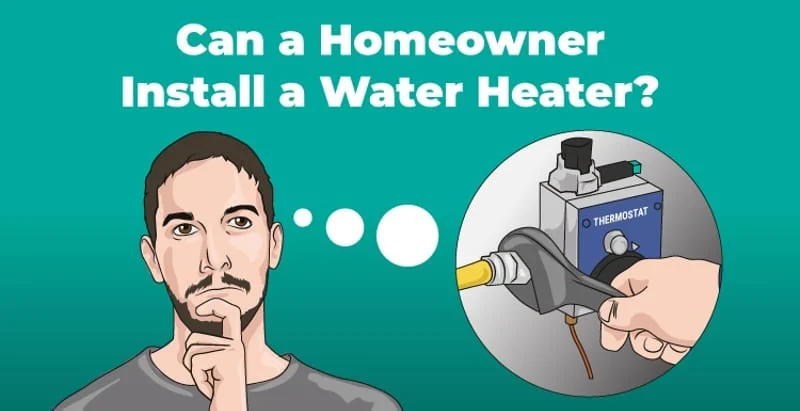Are you asking, “can a homeowner install a water heater?”
If so, you’re in the right place. Our complete guide covers the process and risks of doing this yourself, and when to call a pro.
Read on to learn more.
We partnered with Networx to help you find local plumbers in your area. Click to below to get a FREE quote.
Can a Homeowner Install a Water Heater?
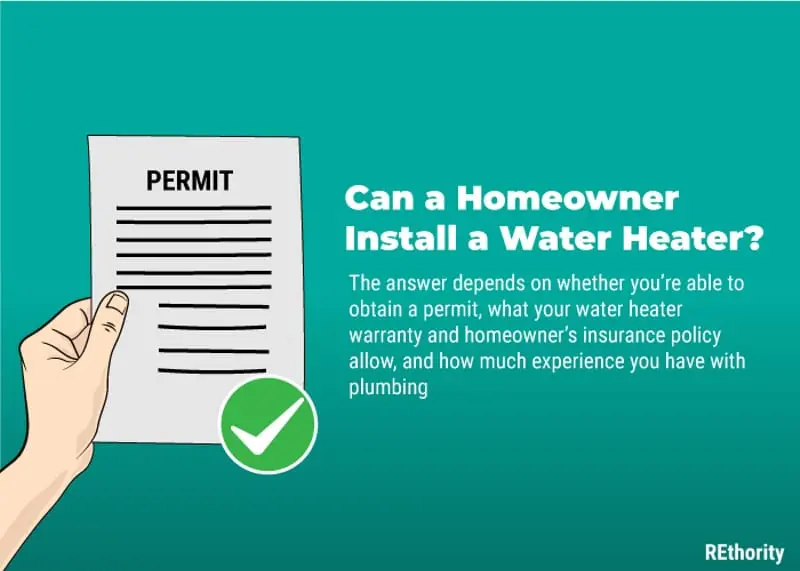
Installing a water heater doesn’t seem like a huge undertaking. Until you know exactly what the process looks like, it’s hard to gauge whether you’re up for the task.
Can a homeowner install a water heater?
In most cases, it’s best to call a plumber to install a water heater for you.
There are several things that can complicate the job. These include whether you’re able to obtain a permit, what your water heater warranty and homeowner’s insurance policy allow, and how much experience you have with plumbing.
Additionally, there are many things that can go wrong.
Wondering what those are?
Read on to learn more.
Permits May Be Required
In many cases, you are required to obtain at least one permit if you’re going to try and install a water heater on your own.
You may need both a plumbing and electrical permit to complete the installation on your own.
If you’re unsure if one or more permits are required for water heater installation in your area, call the local building department.
Plumbing Permit
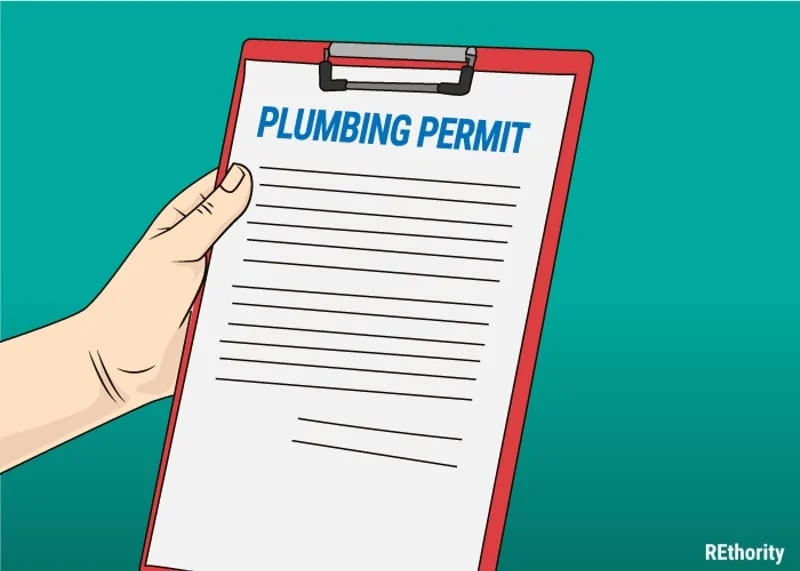
Many states and municipalities require that you get a plumbing permit if you plan to install, change, or relocate any part of a plumbing system.
Permits may seem over the top for smaller plumbing jobs, but installing a water heater is not a small task. All plumbing systems handle wastewater and drinking water separately according to codes.
A simple mistake while installing a water heater could lead to wastewater and drinking water mixing.
Bacteria, viruses, fungi, and parasites from wastewater can make their way into drinking water if plumbing is not installed correctly.
Electrical Permit
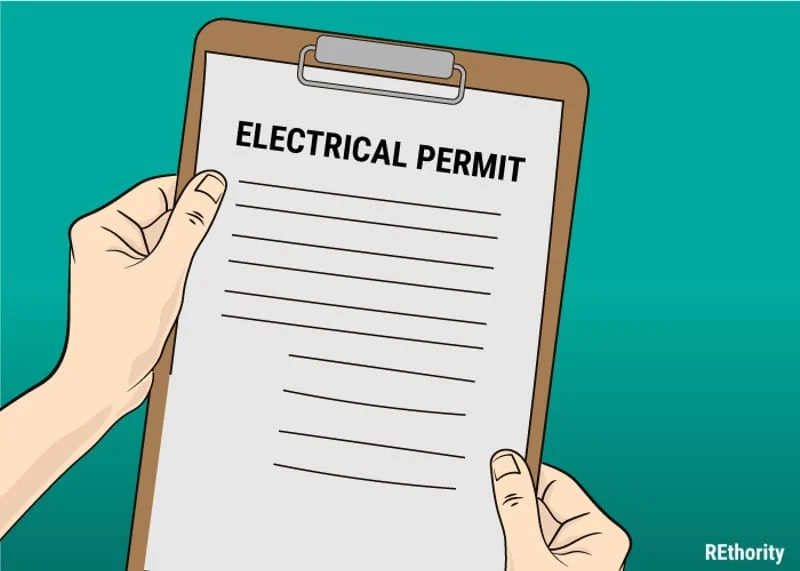
You may also need an electrical permit if you have to make any change or modification to the electrical wiring or breaker when installing a new water heater.
If the new water heater is larger or requires more power than the previous water heater, you will need new wiring (in a larger gauge) and breaker to allow more current to flow through.
Without making the proper electrical changes, your new water heater will draw too much power and continuously trip the circuit breaker.
Electric systems are dangerous to work with if you are inexperienced. If electrical changes will be required for your new water heater, or if you’re not sure, err on the side of caution and call a professional.
They will obtain any needed permits before beginning and will ensure the job is done properly and safely. Doing it wrong can compromise your time, money, and even your safety.
Warranties and Insurance May Be Voided
Important financial safety nets, including your water heater warranty and homeowner’s insurance coverage, may be voided if you choose to install a water heater yourself without a licensed professional.
Water Heater Warranty
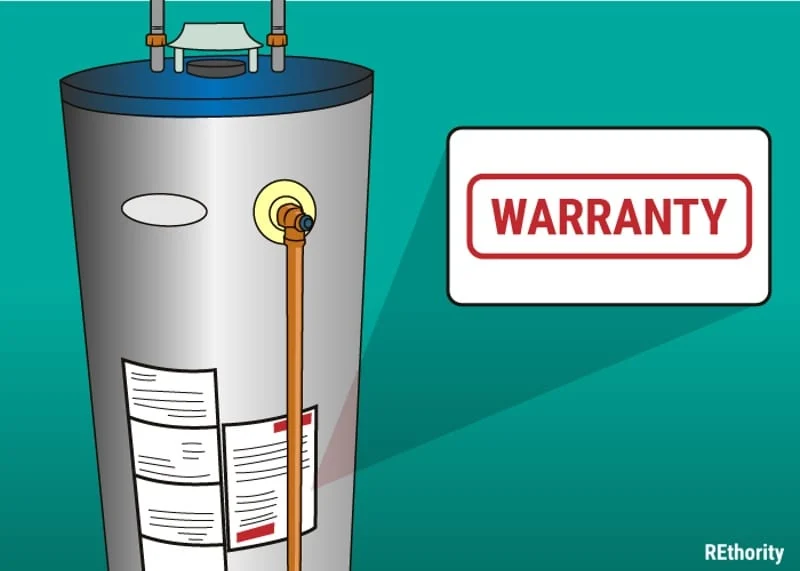
Your water heater warranty likely has a condition that a professional, licensed plumber must install the water heater.
The water heater manufacturer may even require a plumber’s license number to register your water heater and activate the warranty.
If you take a chance and install the water heater yourself, you may find yourself unable to take advantage of the warranty.
And God forbid something happens to your water heater right away or down the road.
In that case, you’ll have to pay for the repairs or full water heater replacement out of pocket.
That ends up being much more expensive than hiring a plumber to take care of the initial installation.
Homeowner’s Insurance Coverage

Your homeowner’s insurance policy should normally cover water damage from burst pipes and plumbing damage (though not from flooding).
If something goes wrong with your water heater and you experience a leak that causes water damage, your insurance coverage takes care of it – as long as a licensed plumber installs it.
If you install a water heater on your own, your insurance policy may refuse to cover any resulting water damage. Your insurance company knows that installing a water heater requires precision and experience.
When a homeowner installs one without a licensed plumber, it increases the chances that the installation will be done incorrectly and result in leaks and water damage down the road.
Improper Installation Is Dangerous
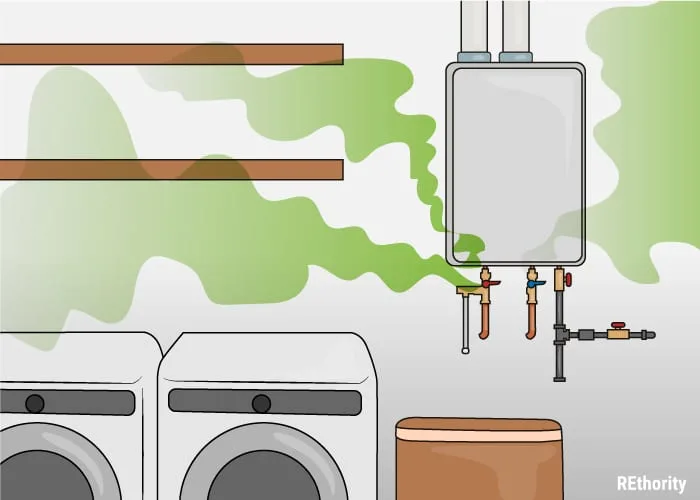
When a plumber installs a water heater, they are aware of all safety rules, local codes, and regulations that apply. Doing it yourself leaves you without that knowledge.
If you’re not sure how to install a water heater or follow instructions online, you might fail to realize that certain codes and regulations govern water heater installation.
Here are just a few ways improper installation of a water heater can be dangerous:
- Improper Venting. The vent on top of the water heater must be connected without any gaps to prevent carbon monoxide, a poisonous gas, from escaping into your home. If even a small gap is present, you risk carbon monoxide poisoning that can result in death.
- Lack of Seismic Strapping. If you live in an earthquake-prone area, your water heater must be securely strapped to prevent it from causing a fire by rupturing supply lines and leaking gas into the surrounding air. Codes require seismic strapping in certain areas.
- Wrong Gas Line Material. Your water heater gas line should not be made of rigid aluminum tubing because the gas may corrode it over time and result in a gas leak. Many building codes will not allow rigid aluminum gas lines.
- Improperly Installed Temperature and Pressure Relief Valve. It can be dangerous if the temperature and pressure relief valve (TPR valve) is not properly installed.If it is not correctly installed, the intense pressure inside the water heater can cause a major explosion that could cause injury, burns, or death. It can also result in water damage that would not be covered by homeowner’s insurance due to a DIY installation.
Common Mistakes When Installing a Water Heater
When you take on a plumbing job like installing a water heater, things can go wrong without the needed knowledge and experience.
It’s a good idea to learn what the most common mistakes are.
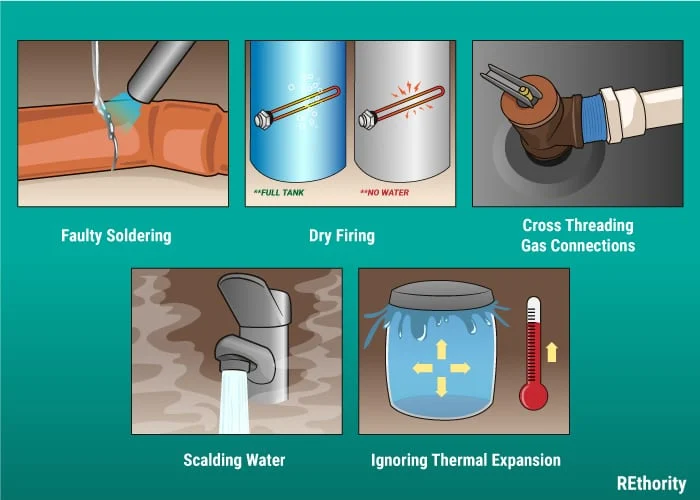
Faulty Soldering
Sweat soldering is the technique licensed plumbers typically use to join two metal surfaces. After the solder is melted on the first metal surface, it is cleaned and reheated to attach the second surface.
The solder “sweats” and fills between the two metal layers, creating a tidy, water-tight, strong bond. DIY water heater installation can go wrong when you don’t know how to sweat solder or any of the actions that lead up to it.
These include:
- Pipe cutting
- Removing burrs from the cut pipe ends
- Fluxing joints
- Ensuring even application of heat
Dry Firing
If you apply heat to an empty water heater tank, you’ve dry fired it. This results in the electrical elements burning out (they need to be immersed in water to stay cool) and even the tank itself cracking.
It’s a common mistake in DIY water heater installation. The water heater must be full of water before the electricity or gas is turned on.
Cross Threading Gas Connections
If you’re threading metal gas connections, you have to be very careful not to overtighten or cross-thread the connections. In fact, this is one of the most annoying mistakes you can make.
Cross threading happens when the metal threads are not fully centered on the opposite connection and cut into the female threads of the hole or nut. This strips the threads and renders the connection useless without a rethreading tap.
Scalding Water
While most water heater thermostats are factor-set to be at a safe temperature (usually 140 degrees Fahrenheit), it’s not uncommon for a DIY installer to inadvertently change the thermostat setting during installation.
If the thermostat is set too high, the water could scald household members and result in severe injury and burns.
Ignoring Thermal Expansion
Thermal expansion is the phenomenon that results in increased water volume when it is heated to a specific temperature. More water volume means your water heater will have overflow with nowhere for the water to go.
So the pressure inside increases to dangerous levels. Water heater expansion tanks are necessary if you’re on a closed-loop water supply system. Most DIY water heater installers don’t realize this and fail to install this safeguard.
Tips From the Pros
What better way to learn about a topic than to hear advice directly from a pro?
We’ve rounded up a few water damage repair pros to help you understand what you’re dealing with.
“Most local codes or zoning ordinances permit a homeowner to install their own water heater, and some jurisdictions even permit unlicensed individuals to install a water heater, but they would most likely need to obtain a permit and then also have the work inspected for safety. As a practical matter, many people have friends with the ‘know how’ to install a water heater without going through the process of obtaining a permit.”
When to Call a Pro
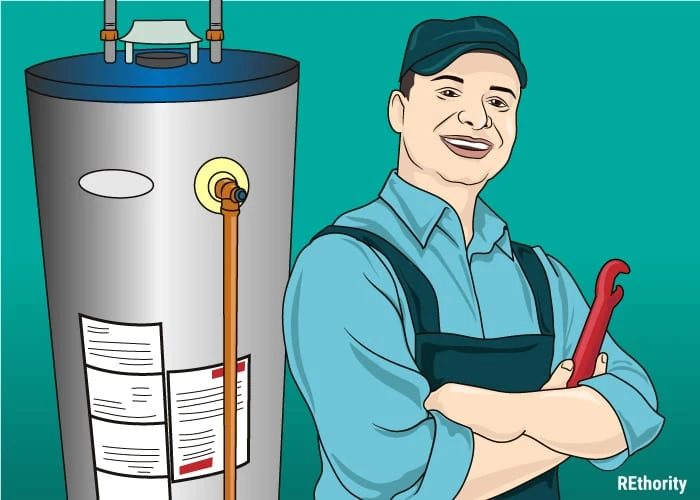
Installing a new water heater when your old one may have just needed a simple repair is a costly mistake, but it’s not uncommon.
Calling a plumber can ensure you don’t waste money on a new water heater if it’s not needed.
Water heaters typically last 10-13 years, so if you are replacing yours before that time, it’s worth it to call a plumber for a second opinion before you purchase a new one.
If you’re still wondering “can a homeowner install a water heater,” you should call a pro. We make it easy with our form below. Simply enter your info to be paired with a licensed, experienced plumber.
We partnered with Networx to help you find local plumbers in your area. Click to below to get a FREE quote.
Final Thoughts
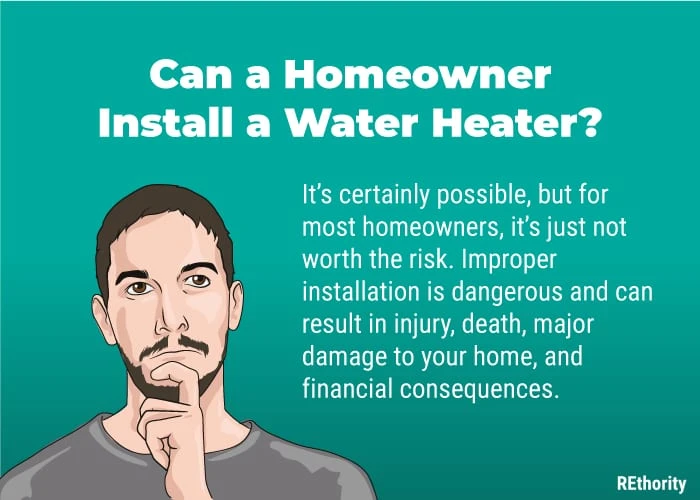
With these safety regulations and installation mistakes in mind, can a homeowner install a water heater?
It’s certainly possible, but for most homeowners, it’s just not worth the risk. Some DIY projects have plenty of room for error, but installing a water heater is not one.
Improper installation is dangerous and can result in injury, death, major damage to your home, and financial consequences.
Any money you may save by attempting installation yourself could quickly be negated if you need to replace the water heater because of a simple mistake like dry firing or improperly soldering metal connections.
The risk of injury or death alone is enough to make most homeowners responsibly leave this job to a professional. To make sure your water heater is installed properly, safely, and according to local codes and regulations, call a licensed plumber.
Resources:

